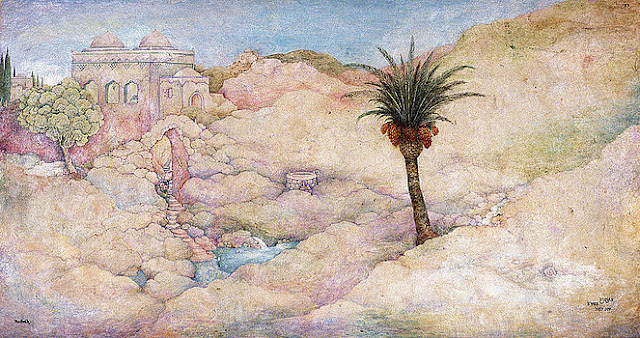New shiur from Rabbi Mendel Kessin
Wednesday, November 30, 2022
Tuesday, November 29, 2022
The Mystery of the Animals Walking in Circles
Rabbi Yosef Biton talking about the recent news of animals walking in circles. It is in Hebrew but below is a rough translation/summary by Rahel. Thank you so much Rahel, those who can't understand all the Hebrew really appreciate it.
Monday, November 28, 2022
Receiving Prophecy in a Dream
Wednesday, November 23, 2022
Monday, November 21, 2022
Blessings You Don't Say but Really Should!
Rabbi Efraim Palvanov
What is the blessing on an elephant? How about an albino? Find out in this class where we explore the power and meaning of the ancient berachot instituted by our Sages.Wednesday, November 16, 2022
Monday, November 14, 2022
Who Was Og the Giant? And Other Big Questions in Genesis
Rabbi Efraim Palvanov Addressing some big mysteries in Sefer Beresheet, the Book of Genesis, and beyond:
- Who was Og and how did he survive the Great Flood?
- What exactly were the Ten Trials of Abraham?
- Why is Eliyahu spelled without a vav in the Tanakh 5 times?
- What is the difference between Chokhmah, Binah, and Da’at (“Chabad”)?
- Which of the “Cosmic Shemittot” are we in?
- Who was the Nachash (the Primordial Serpent) in Eden?
- Does God create evil?
- Is the Torah written in ancient Hebrew script or in Assyrian/Ashuri script?
- How will all of history be revealed in the Messianic Age?
- Is there a rational way to understand the Great Flood?
- Where was the Garden of Eden located?
More on the incredible story of Og (with archaeological evidence): click here
More useful links at You Tube source: click here
Connecting to the Source
 |
| Art ''Holy Land'' Michoel Muchnik |
Friday, November 11, 2022
Guests of Honour
Based on Likutei Sichos of the Lubavitcher Rebbe, Gutnick Chumash
Wednesday, November 9, 2022
Monday, November 7, 2022
The Descent of a Lofty Soul: Moshiach
 |
| Art by Andreas |
And they gave their father wine to drink on that night, and the elder came and lay with her father, and he did not know of her lying down or of her rising up - וּבְקוּמָֽהּ
According to the Zohar, the dot in the הּ in the word וּבְקוּמָֽהּ [Vayera 19:33] alludes to the fact that G-d was secretly assisting this event, because Moshiach was to materialize from it [since Ruth, King David's great grand-mother, was a convert from the Moabites]. The latter event, between Lot and his younger daughter [19:35] is written without the letter vav - וּבְקֻמָֽהּ - to indicate that the union did not produce such great offspring. Rabbi Shimon said "When the verse states that Lot ''wasn't aware'', it means he wasn't aware that Moshiach was destined to come from this union" [Zohar I 110b]
Source: Lubavitcher Rebbe
Sunday, November 6, 2022
Friday, November 4, 2022
11 Cheshvan: Yarzheit Rochel Imeinu
Jewish Mother's Day The 11th of Cheshvan
Rachel lost her own spiritual luxury - the privilege of being buried in the Cave of Machpeilah - in order to help her children. This represents the unparalleled quality of the "Jewish mother" who is always willing to sacifice her own needs, spiritual or physical, for the sake of helping her children.
*******************
Thursday, November 3, 2022
Are We Witnessing the Prophecy?
Current News
Wednesday, November 2, 2022
Tuesday, November 1, 2022
Noah's Ark and the Tower of Babel: Not What You Think!
Monday, October 31, 2022
Father of Many Nations
Source: Chanan Morrison from the writings of Rav Kook
Notarikon in the Torah - [Notarikon is a method of deriving a word, by using each of its initial
(ראשי תיבות) or final letters (סופי תיבות) to stand for another, to form a sentence or idea out of the words]
Thursday, October 27, 2022
Hakhel Year: 8 things to Ponder
Rabbi Aaron L Raskin [28 min video]
Wednesday, October 26, 2022
The Post-Flood Era
Chassidic thought teaches that before the Flood, G-d sustained the world despite its low spiritual standing, due to His attribute of kindness. There was a limit, however, to how long G-d was willing to sustain a world without merit - hence the Flood.
- Noach was unaware of the above, so he was scared to repopulate the world, fearing it would be destroyed again. Therefore, G-d had to re-command him to ''be fruitful and multiply''. [Noach 9:1]
- The inner reason why Noach's generation failed to repent was because, before the Flood, the world was spiritually insensitive.
- Meat is an extremely coarse food that can lead a person to excessive physicality. Thus, it was only permitted to the spiritually-attuned post-Flood generation. [Noach 9:3]
- Before the Flood, people had extremely long lifespans because the world was sustained by G-d's kindness which was bestowed disproportionately to people's merits.
- Before the Flood, physicality was more coarse. This was true in a literal sense, to the extent that the clouds were too thick to refract light, so a rainbow never appeared. After the Flood, physicality become more refined, so the clouds began to refract light. Thus, the rainbow was not only a ''sign of G-d's promise not to destroy the world, it was also a physical consequence of the refinement of the world that ensured its permanent existence.















